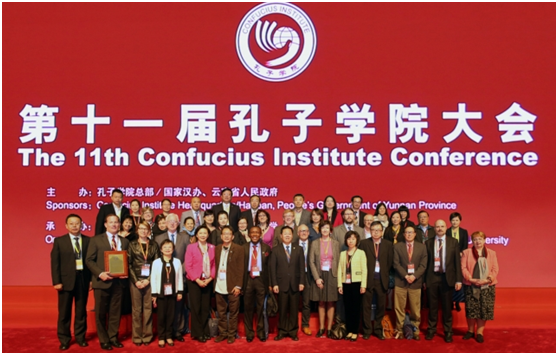XMU delegation headed by President Zhu Chongshi attends 11th Confucius Institute Conference
From December 10-11, the 11th Confucius Institute Conference was grandly held in Kunming City, Yunnan Province. With the theme of “Innovation, cooperation, inclusiveness and sharing”, this conference has attracted over 2,200 participants including presidents and representatives of Confucius institutes from 140 countries and regions who had a two-day discussion on such topics as the Chinese cultural exchange, the development of Confucius institutes and the “One Belt and One Road”. Chen Baosheng, Minister of Ministry of Education of the People’s Republic of China, and Vice-president of the Council of the Confucius Institute Headquarters, took the chair. Liu Yandong, Vice-premier of State Council, and President of the Council of the Confucius Institute Headquarters, delivered a keynote speech and presented awards to excellent individuals and institutions at the opening ceremony. Also present were Zhu Chongshi, President of XMU, Zhan Xinli, Vice-president of XMU, and several officials from the Southern Base of Confucius Institute Headquarters/Office of Confucius Institute Affairs and Office of International Cooperation and Exchange of XMU, as well as representatives from 16 foreign partner colleges.

Vice-premier Liu Yandong pointed out that it is necessary for all parties to join hands to open up new horizon for the development of Confucius institutes. He quoted President Xi Jinping as saying that “Confucius Institutes belong to China, and to the World as well”.
During the conference, President Zhu Chongshi attended the symposium on the development of the Confucius Institutes and One Belt and One Road, presided over the sub-forum for the university presidents, and summarized with regard to the forum at the closing ceremony. He noted on multiple occasions that the future progress of the Confucius Institutes rests a lot with the deans’ capacity and communicative skills, and such issues as the engagement of local teachers and the professionalism of Chinese teachers are particularly worthy attention. It’s necessary to proactively seize the opportunity to enhance the building of the Confucius Institutes along the route of “One Belt and One Road” and expand collaboration and exchange with foreign countries on full scale. Besides, he stressed that varied Confucius Institutes need to figure out how to best operate and adapt under the new circumstances to rev up the disciplinary construction of the partner universities at home and abroad and ultimately to achieve the inner development of Confucius institutes.
The annual Confucius Institute Conference, as a grand gathering for all the Confucius Institutes from all over the world, has been hailed as the Davos within the realm of education. So far, there are 511 Confucius Institutes and 1,073 Confucius classes established in 140 countries around the world. These Confucius institutes have played a vital role of bridge for mutual exchange and learning between China and other civilizations, meanwhile they have also served as a great window for the outside world to know China and thus to deepen friendship and cooperation between China and other countries.
In 2016, Xiamen University has established 16 Confucius institutes and 44 Confucius classes with a total enrollment of 40,607 students, a rise of 28% compared with that of last year, and has held 760 cultural events, both of which have maintained a momentum of high-speed increase for 10 consecutive years. Additionally, bilateral exchanges in increasingly diverse forms between Xiamen University and its partner colleges have become more frequent. This year, XMU has successfully held a forum for the university presidents called the “21st Century Maritime Silk Road”, and organized a series of cultural events including XMU art troupes’ tour to several colleges in Britain and University of Malta, the joint concert performed by symphony orchestras from University of Trier and Xiamen University, etc. Moreover, such events as “UWr Day” and “Mae Fah Luang University Day” at Xiamen University, and “Xiamen University Day” at the University of Southampton, have all greatly propelled bilateral exchanges and cooperation and expanded the influence of its Confucius Institutes.
Source: http://news.xmu.edu.cn/b6/db/c1552a243419/page.htm
Edited by Zhou Jin





